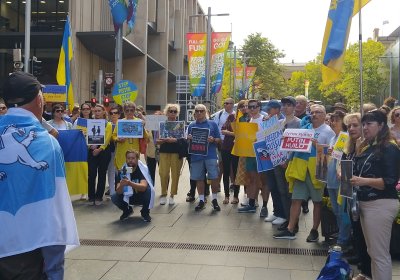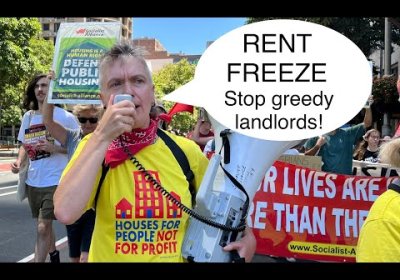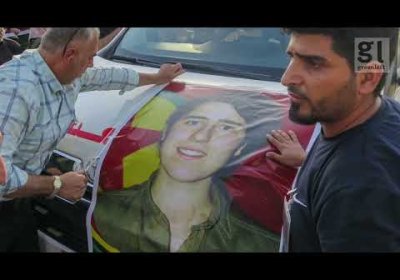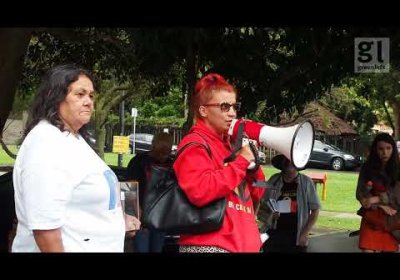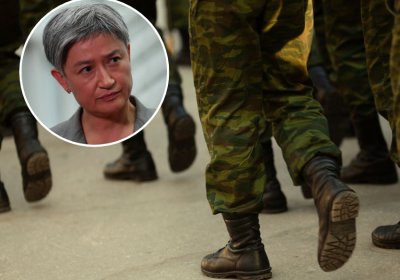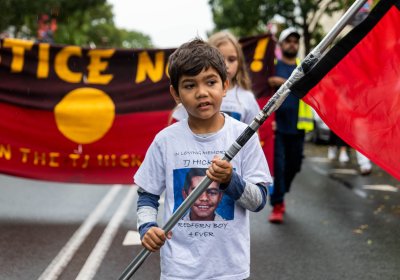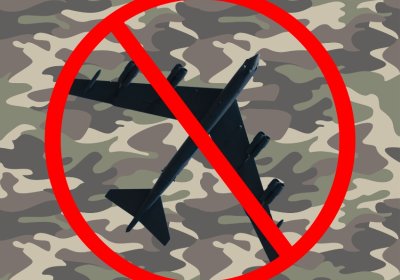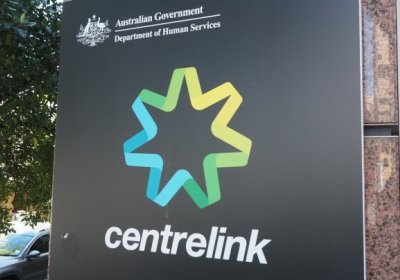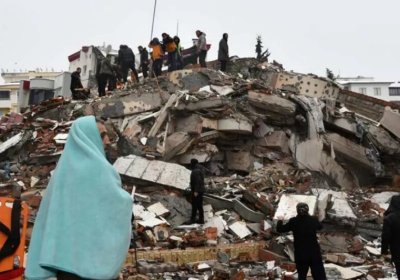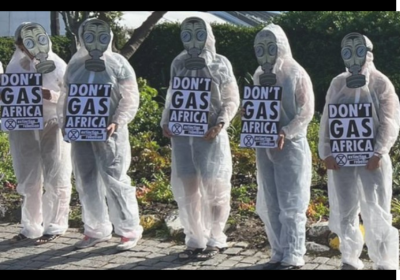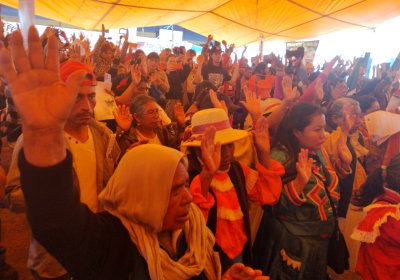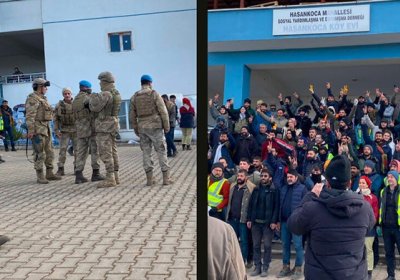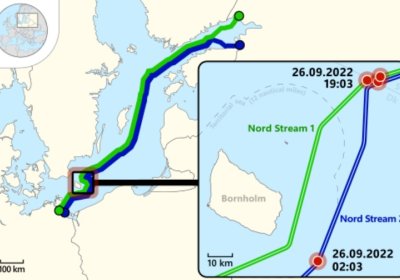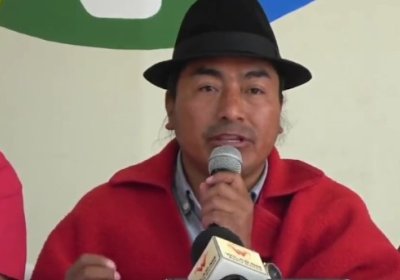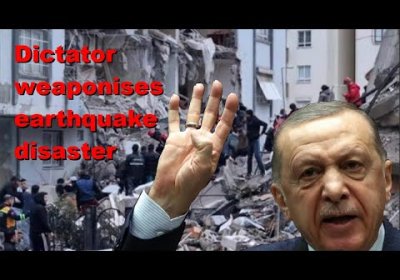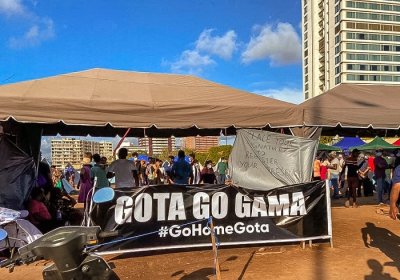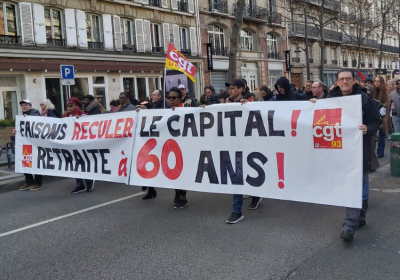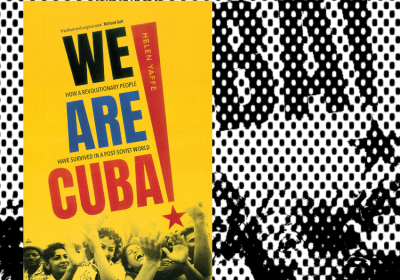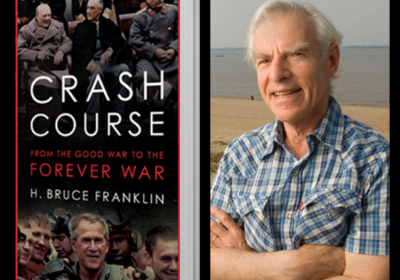A protest outside PM Anthony Albanese's electorate office was one of several protests around the country demanding that the AUKUS nuclear submarine deal be scrapped. Video by Peter Boyle.
Issue 1375
News
Anti-war protests outside MPs’ offices demanded that AUKUS be scrapped and the $170 billion allocated to nuclear-powered submarines be instead spent on human need, reports Pip Hinman.
Members of the Ukrainian community joined anti-war Russians to protest the one-year anniversary of Russia’s invasion of Ukraine at a rally in Martin Place. Federico Fuentes reports.
The Socialist Alliance is calling for a two-year rent freeze in its platform for the coming NSW state election, according to Rachel Evans, the party's candidate for the seat of Heffron.
Federal environment minister Tanya Plibersek has just quietly approved another Santos fracking project in Queensland’s Surat Basin, writes Callum Foote.
NSW Police arrested a housing activist at midnight on February 18 after a housing protest the day before. Kerry Smith reports.
Community groups will host a candidate forum in the Balmain electorate in the lead-up to the New South Wales elections with a focus on how local democracy is best served. Peter Boyle reports.
An exhibition of photographs in the Stirrup Gallery at the Addison Road Community Centre will raise funds for earthquake relief in Rojava. Peter Boyle reports.
Neo-Nazi extremist Desmond Liddington has been sentenced for his part in an attack on the home of anti-racists. Kerry Smith reports.
Residents of Mudgee and farmers protested outside the Independent Planning Commission against Bowdens Silver's plan to mine silver, lead and zinc, near the village of Lue. Jim McIlroy reports.
Episode 2, February 20, 2023. Green Left journalists Ben Radford and Isaac Nellist take you through the latest news from Australia and around the world.
The practice of stealing Aboriginal children from their families has continued since Kevin Rudd's apology and it needs to stop, a Sorry Day protest was told. Rachel Evans reports.
The Asylum Seeker Resource Centre is facing the terrible prospect of having to close its doors in six weeks due to funding shortages caused by cost-of-living pressures impacting on donors. Sue Bolton reports.
Under pressure from transgender activists and allies, nearly all states have adopted progressive gender recognition laws. But, as Nova Sobieralski reports, more needs to be done.
The Rideshare Drivers Network called for action on safety after Uber driver Scott Cabrie was allegedly killed by a passenger in Queensland. Isaac Nellist reports.
Auntie Gail Hickey, her family and supporters marched through Redfern to demand justice for TJ Hickey, 19 years after the 17-year-old Kamilaroi youth died while being pursued by NSW Police. Peter Boyle reports.
Analysis
Those who thought the federal Labor Party supported reforming the antiquated war powers would be startled to hear Foreign Affairs Minister Penny Wong make it clear the government does not. Pip Hinman reports.
Livestream of the forum on Treaty, Sovereignty and First Nations justice with Lidia Thorpe, Uncle Gary Murray and Sue Bolton.
Labor's safeguard mechanism should be scrapped and replaced with a policy designed to reduce emissions, argues Alex Bainbridge.
The Reserve Bank of Australia claims it is “fighting inflation” by hiking up interest rates. But, as Zane Alcorn argues, it has never been independent of the capitalist class and is dutifully carrying out its interests.
Residents of the defect-plagued Mascot Towers building say solutions proposed by the major parties do not go far enough. Jim McIlroy reports.
As wages stagnate and the cost-of-living crisis worsens, it’s time to re-evaluate the role of work in our lives and the economic system, argues Isaac Nellist.
The policies of successive NSW governments to not build new public housing and sell off old stock is worsening the housing crisis, writes Paul Gregoire.
Senator Lidia Thorpe should be congratulated for putting a Treaty with First Nations people on the political agenda. Progressives need to support that campaign, argue Jacob Andrewartha and Sue Bolton.
Foreign affairs minister Penny Wong told Senate estimates that she was happy to defer to Washington on whether or not the B52s stationed in Australia would carry nuclear weapons. Binoy Kampmark reports.
More privatisations of public assets are in store for New South Wales as Premier Dominic Perrottet refuses to rule out more sell-offs. Jim McIlroy reports.
Is ChatGPT a challenge to humanity? For Aleks Wansbrough, ultimately, it is the product of human beings, reflecting and refracting current social relations.
Public housing is only 12% of all housing in Waterloo. But the NSW government wants to reduce that by selling off the Waterloo estate. Karyn Brown says it should be ashamed.
Anti-war and peace networks are organising a national protest outside federal MPs’ offices, demanding an end to AUKUS and the billions being wasted on a new arms race. Pip Hinman reports.
There is a disconnect of time scales between the relatively short-lived exploitative mining and Traditional Owners’ ancient connection to Country. Susan Norrie writes about her and artist colleagues' approach to a commission.
The Robodebt royal commission has revealed that lower level Centrelink workers were telling their bosses that the system was wrong and cruel. They were not listened to, writes Sue Bolton.
NSW is heading towards an election and communities are wondering if a future Labor government will make the necessary changes. Socialist Alliance candidate Rachel Evans talks about housing justice and her campaign.
Public school funding has been on the decline for years. No wonder older, experienced teachers are so angry, writes Sue Bull.
The terrible earthquake disaster in Turkey and Syria should make us ponder the meaning of community and nation as well as security and sovereignty, writes Stuart Rees.
World
Two controversial German figures, Sarah Wagenknecht and Alice Schwarzer, released a Peace Manifesto on February 10, which gathered close to half a million of signatures in less than a week, reports Sibylle Kaczorek.
Don't Gas Africa believes “Africa has a monumental opportunity to pursue sustainable socioeconomic development without relying on fossil fuels”, reports Jessica Corbett.
Tens of thousands of Colombians took to the streets to support progressive social and economic reforms proposed by President Gustavo Petro, reports Ana Zorita.
Movements, organisations and Indigenous communities gathered in the Assembly for Water and For Life over February 18–19, reports Tamara Pearson.
Turkish President Recep Tayyip Erdoğan is weaponising the triple earthquake disaster in south-eastern Turkey and north-eastern Syria against the Kurdish population by blocking and delaying emergency responses, reports Peter Boyle.
Seymour Hersch's allegations of United States Navy involvement in the sabotage of the Nord Stream pipelines has been denied by US officialdom, but questions still remain, writes Binoy Kampmark.
Progressive forces swept Ecuador’s local elections on February 5 as opposition grows to the right-wing Guillermo Lasso government, reports Ana Zorita.
Barcelona has suspended official ties with Israel over its violation of Palestinian rights, reports Dick Nichols.
Turkish dictator President Recep Tayyip Erdoğan is using the earthquake disaster as a weapon in his ongoing war on the Kurdish people according to Zerebar Karimi.
Seven months on from the Sri Lankan popular uprising, Janaka Biyanwila looks at how government spin, backed up with state violence, is attempting to keep a lid on popular discontent.
The dynamism of the movement to defend pensions is inspiring, but even many strikers think that the government will never back down. John Mullen asks, can Macron be beaten, and if so, how?
Culture
Mat Ward looks back at February's political news and the best new music that related to it.
If there is one theme to Helen Yaffe’s book We Are Cuba!, it is survival, writes Ian Ellis-Jones.
Ian Angus presents seven new books on how the world works, from cells to imperialism.
Bill Nevins reviews Crash Course, H Bruce Franklin's memoir of lifelong anti-war resistance, which cuts through the fog of myth and propaganda to make sense of modern history.


